
















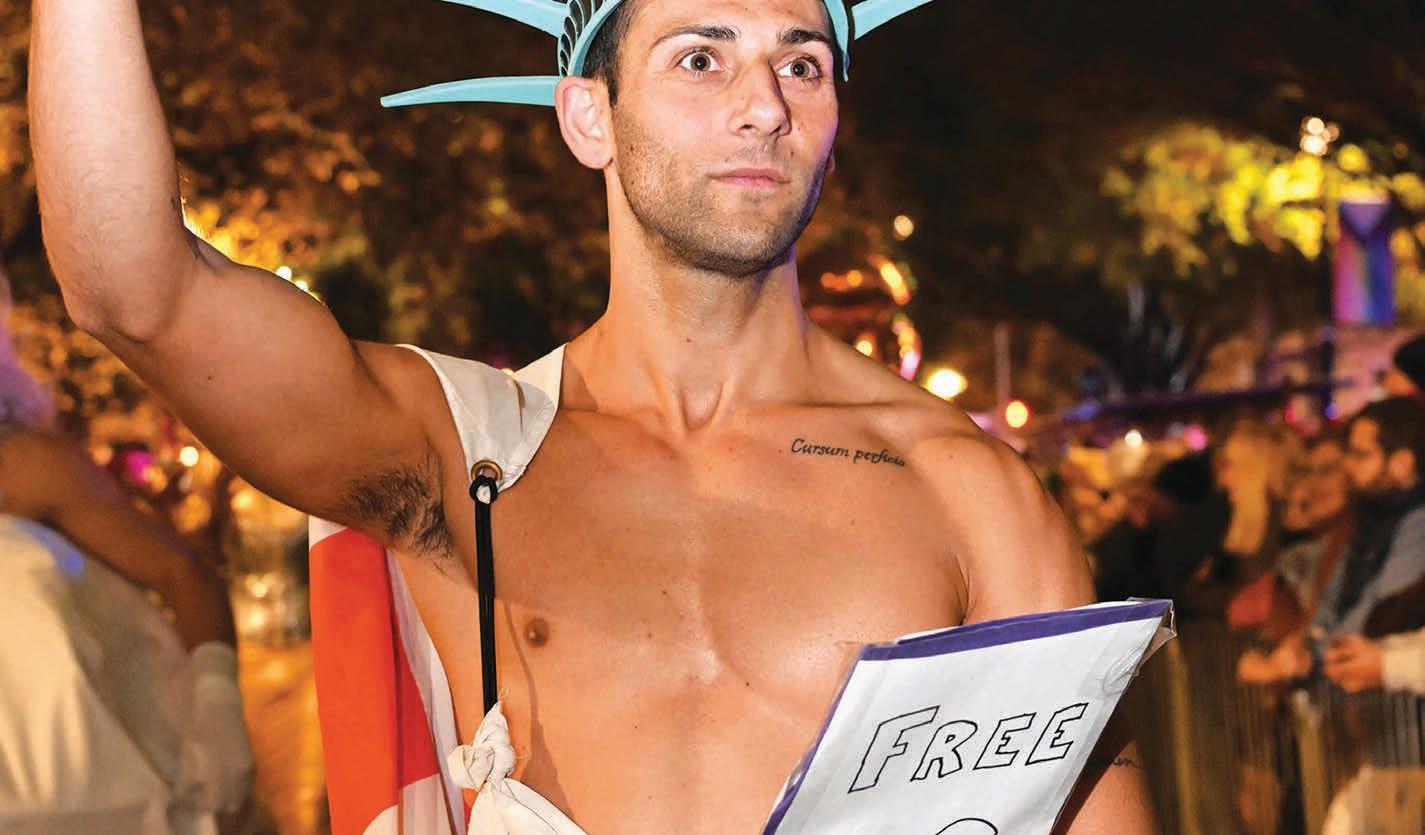





This year’s celebrations turn political amid turmoil, PAGES 24 & 34














































ADDRESS PO Box 60664
Washington DC 20039
PHONE
202-747-2077
news@washblade.com
INTERNET washingtonblade.com
PUBLISHED BY Brown Naff Pitts Omnimedia, Inc.
PUBLISHER
LYNNE J. BROWN
lbrown@washblade.com ext. 8075
EDITORIAL
EDITOR
KEVIN NAFF
knaff@washblade.com ext. 8088
SR. NEWS REPORTER
LOU CHIBBARO JR. lchibbaro@washblade.com ext. 8079
WHITE HOUSE CORRESPONDENT
JOE REBERKENNY
jreberkenny@washblade.com ext. 9463
INTERNATIONAL NEWS EDITOR
MICHAEL K. LAVERS mlavers@washblade.com ext. 8093
POP CULTURE REPORTER
JOHN PAUL KING
PHOTO EDITOR
MICHAEL KEY mkey@washblade.com ext 8084
CONTRIBUTING WRITERS
DANIEL ITAI, ISAAC AMEND, TINASHE CHINGARANDE, PETER ROSENSTEIN, PATRICK FOLLIARD, TERRI
SCHLICHENMEYER, JOE PHILLIPS, EVAN CAPLAN, ANKUSH KUMAR, ESTEBAN RIOSECO, SAM KISIKA, ELVIS KAWEDO, JAKE STEWART, HENRY CARNELL, DAWN ENNIS CREATIVE DESIGN/PRODUCTION
MEAGHAN JUBA production@azercreative.com
SALES & ADMINISTRATION
DIRECTOR OF SALES & MARKETING
STEPHEN RUTGERS srutgers@washblade.com ext. 8077
SR. ACCT. EXECUTIVE
BRIAN PITTS bpitts@washblade.com ext. 8089
CLASSIFIED ADVERTISING/ADMINISTRATION
PHILLIP G. ROCKSTROH prockstroh@washblade.com ext. 8092
NATIONAL ADVERTISING
RIVENDELL MEDIA 212-242-6863; sales@rivendellmedia.com
For distribution, contact Lynne Brown at 202-747-2077, ext. 8075. Distributed by Southwest Distribution Inc.




Powerful performances, mesmerizing music & fiery zapateo

Spain Flamenco Arts CRÓNICA DE UN SUCESO
Choreographed & performed by Rafael Ramírez
NOV 6 - 9
Presented by TORCUART AULA DE FLAMENCO
NOV 8, 2 pm FREE
Flamenco Aparicio Dance Co. ENREDO

Directed by Edwin Aparicio & Aleksey Kulikov
NOV 14 - 16
Compañía Flamenca Irene Lozano LAS MUJERES QUE HABITAN EN MÍ
NOV 21 - 22







FROM STAFF REPORTS
Clear Space Theatre Company and the City of Rehoboth Beach have agreed to create a public-private partnership to redevelop city-owned land into a new performing arts center, the theater announced Friday.
The CSTC board of directors formally accepted the letter of intent from the city on Oct. 23, wrapping up an 18-month process for site selection for its new performing arts center.
With the agreement, Clear Space commits to remaining in Rehoboth Beach, where it has been based since 2010.
Based on the terms of the letter of intent, Clear Space will enter into a land lease of 11 Christian St. after the Cape Henlopen Senior Center relocates to its next home outside the city limits on Hebron Road, according to the announcement. The senior center has been a tenant on city land for 45 years, but was gifted land to expand its operations and will move after the completion of a capital campaign. At that time, Clear Space will begin a lease of up to 50 years. The land, which has been valued at $7.2 million, will be made available to Clear Space for $1 per year.
The new performing arts center will include a proscenium mainstage, a fl exible seating black box, a rehearsal studio, expanded lobby, concessions, and backstage facilities, and gallery space, according to the announcement. Parking will be provided on site
“On behalf of the Board of Commissioners, I am thrilled that Clear Space has selected our offer and

plans on staying in the City of Rehoboth Beach,” Mayor Stan Mills said in a statement. “Clear Space has always enriched Rehoboth Beach culturally, socially, creatively, and economically. It is a top-notch performing arts center that is near and dear to our residents, visitors, and business owners. We believe it’s a winwin, and we look forward to many more years of our partnership with Clear Space.”
“We are grateful to Mayor Mills for fi rst proposing that Clear Space consider the site at 11 Christian
By PETER ROSENSTEIN
The Comings & Goings column is about sharing the professional successes of our community. We want to recognize those landing new jobs, new clients for their business, joining boards of organizations and other achievements. Please share your successes with us at comingsandgoings@washblade.com.
Congratulations to Brittany Anderson named executive director of Pride At Work. Since August 2024, Anderson has served as interim executive director, helming the revitalization of the membership-based organization during a time of national crisis, leading the way in building LGBTQ worker power in the U.S. Upon her appointment, she said, “The LGBTQIA+ and labor movements create strong organizers and leaders. At that intersection, Pride At Work is a uniquely powerful vehicle to shape workplaces, laws, and a country, that sets queer people up to thrive even beyond what is narrowly considered ‘LGBTQIA+ issues.’ We need
healthcare that not only includes gender affirming care, but is actually affordable and accessible. We need living wages and job security, that mean we don’t have to do careful math with every item we place in our grocery cart. We need to be able to retire with dignity.”
Anderson has been a dedicated Pride At Work member for more than a decade, and was elected as national co-president in 2022. She was also elected to the organization’s National Executive Board in 2018 and as president of the NYC/Long Island Chapter in 2015. She joined the labor movement in 2011 as part of Occupy Wall Street, where union organizers took her under their wing.
As a retail worker in New York City, she went on to work for the RWDSU/UFCW Local 338, and the RWDSU International Union in multiple roles, including new organizing, electoral and legislative campaigns, creating and facilitating trainings, and representing workers
Street back in March 2024,” said Clear Space Managing Director Joe Gfaller.“Without his encouragement, the site might not have been explored as one of the nine in our 2024 market study. As our analysis winnowed down our preferred sites, the City of Rehoboth Beach’s staff and elected offi cials were consistently excellent partners, negotiating fairly and transparently in the interest of the citizens, business owners, and visitors of Rehoboth Beach.”
The total cost for the new performing arts center is approximately $40 million, according to the announcement, with a national RFP process for the project’s architect coming soon along with community forums for residents and audiences to follow in 2026.
The development ends years of contentious debate about the location of the new theater complex. In 2021, The Rehoboth Beach Board of Commissioners voted for the second time to overturn a decision by the city’s Planning Commission to approve plans by Clear Space to build a larger theater and adjacent rehearsal theater in a new downtown location.
Supporters of the project expressed outrage at the time over the Board of Commissioners’ 4 to 3 vote to reject the Planning Commission’s approval and deny the Clear Space application to build its proposed new theaters on Rehoboth Avenue, which serves as the city’s main commercial boulevard. The controversy led to speculation that Clear Space could relocate outside of Rehoboth to Route 1 or even to nearby Lewes, Del.
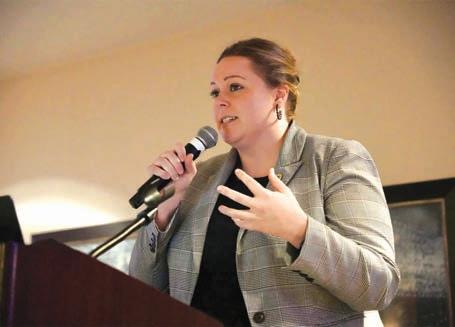
fighting for justice and fair contracts on the job. She moved back to her home state of Minnesota in 2017 to become field director of the Southeast Minnesota Area Labor Council. Anderson worked as the 2020 statewide canvass director for Faith in Minnesota/ISAIAH, and IAM District Lodge 77, working on organizing campaigns across the Midwest.






Warns of ‘major constitutional lawsuit time’
By JOE REBERKENNY | jreberkenny@washblade.com

Adelita Grijalva was elected by Arizona’s 7th District with overwhelming support in a special election in September. More than a month has passed, and she has yet to be sworn in, marking the longest delay of a swearing-in in American history. Republicans—most notably Speaker of the House Mike Johnson—blame the government shutdown for the delay, despite having the power to call the House in session for her swearing-in. Grijalva, however, believes other motives are at play.
Republicans currently control the House, Senate, the executive branch, and a majority on the Supreme Court, giving party leadership the ability to act in line with their goals, including supporting President Donald Trump.
Trump’s motives, according to observers, appear tied to consolidating power and controlling sensitive information. During his campaign, he promised to release the Epstein files—a collection of documents detailing the alleged crimes of convicted sex offender Jeffrey Epstein, his associates, and other high-profile figures, perhaps including Trump. Despite
Va.
to determine
controlling the Department of Justice, which holds the files, Trump has still not fully released them and has criticized supporters who continue to demand disclosure.
Grijalva has been vocal about her support for releasing the files, a stance that helped her secure a decisive victory in the special election. Once sworn in, she would become the 218th member of the House to support a discharge petition, potentially forcing a vote that Johnson has delayed on releasing the files. She believes this is a major reason for her delayed swearing-in.
“It shouldn’t matter my party. It shouldn’t matter whether I am going to support whatever agenda Speaker Johnson has,” Grijalva told the Blade in an exclusive interview on Tuesday. “I should be sworn in, period.”
Her frustration with the delay is compounded by the real-world consequences for her constituents. She emphasizes that this is not just a political game.
“I don’t care who’s implicated. I don’t care what party they are. If you committed a crime, if you’re a pedophile, if you raped children and women, then you deserve legal consequences, and the survivors need to be able to try to move on and see justice for what they said has happened to them, have consequences, and then be able to move forward.”
Grijalva warns that the stakes go beyond the files, extending to the functioning of government itself.
“For there to be votes in Congress, and I’m not sworn in before that happens, that would be major constitutional lawsuit time. The unfortunate part is, who’s really suffering through all of this are the federal workers and the 900,000 Arizonans who use SNAP benefits—they don’t know if they’re going to get a check or be able to feed their families.”
Following in her father’s footsteps, who held the same House seat until his death earlier this year, Grijalva also emphasized her commitment to the LGBTQ community and her outspoken support for trans rights—at a time when transgender identity is increasingly targeted by Republicans and other conservative figures, including Johnson and Trump.
Her stance is clear and uncompromising:
“Trans rights are human rights. That’s it. I’m going to speak up for those who don’t feel like they have a voice and don’t have a place at the table — that means everybody,” she said.
With the prolonged delay and high stakes, Grijalva’s fight to be sworn in is as much about representation as it is about accountability. Her unwavering advocacy signals the priorities she will champion once in office. The Blade will publish the full interview with Grijalva later this week.
By SHREYA JYOTISHI
Virginia will hold elections on Nov. 4 for governor, lieutenant governor, attorney general, and the House of Delegates. A “moral opposition” to marriage equality and anti-transgender advertisements, among other things, have shaped current polling numbers and the election’s relevance to LGBTQ voters
With one week before election day, Democrats may face a split ticket result, considering former state Del. Jay Jones’s text message scandal that shook up the attorney general race. Democratic former Congresswoman Abigail Spanberger and Republican Lt. Gov. Winsome Earle-Sears are competing for the governor’s office. Spanberger leads Earle-Sears by seven points among Virginia’s likely voters, according to an Oct. 27 poll by Christian Newsport University.
Earle-Sears declared during the gubernatorial debate that opposing marriage equality and employment protections for the LGBTQ community is “not discrimination.” The candidate also holds a “moral opposition” to marriage equality.
Spanberger, supported by former President Barack Obama and former Transportation Secretary Pete Buttigieg, holds a record of supporting LGBTQ rights, specifically in co-sponsoring the Equality Act, which would enshrine non-discrimination protections for LGBTQ people in federal law.
An ad from Restoration of America PAC, a collection of conservative groups, describes Spanberger “as extreme as it gets” because of her stance on trans rights.
State Sen. Ghazala Hashmi holds a two point lead against Republican John Reid, according to the CNU poll. The Democrat’s advantage narrowed from a previous 48-39 percent lead.
Reid, a conservative talk show host, is the first openly gay person nominated for a Virginian statewide office. The candidate, however, denies the existence of trans people on his campaign website and has pledged to vote against a constitutional amendment that would protect marriage equality in Virginia.
Reid earlier in the campaign faced calls from Republican Gov. Glenn Youngkin, who Virginia law prevents from running for a consecutive term, and others to drop out after pornographic images he allegedly posted on social media emerged.
Hashmi’s record includes supporting marriage equality protections and sponsoring a bill to protect doctors who provide gender-affirming healthcare to patients who don’t live in Virginia.
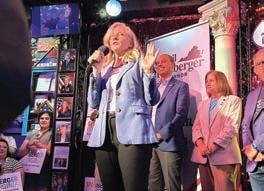
Incumbent Republican Jason Miyares holds a one point lead against Jones, according to the CNU poll conducted after the text message scandal. The National Review earlier this month published screenshots of Jones texting a colleague about a scenario in which he shot former Virginia House Speaker Todd Gilbert, a Republican.
The publication of the August 2022 conversation led to President Donald Trump demanding Jones to drop out of the race, Spanberger expressing “disgust” toward him, and Earle-Sears encouraging voters to “reject the insanity.”
Jones still holds 91 percent support among Democrats, although the number is a drop from a previous CNU poll that found 96 percent of Democrats backed him.
All 100 Virginia House of Delegates seats are on the ballot. The CNU poll finds that, upon asking likely voters the party for which they intend to vote, Democrats hold an eight point lead over Republican candidates.
The LGBTQ+ Victory Fund, a political action committee seeking to increase LGBTQ political power, has endorsed
eight House candidates: State Dels. Rozia Henson (D-Prince William County), Laura Jane Cohen (D-Fairfax County), Joshua Cole (D-Fredericksburg), Marcia Price (D-Newport News), Adele McClure (D-Arlington County), and Mark Sickles (D-Fairfax County) and Lindsey Dougherty and Risë Hayes.
Dougherty and Hayes are both challenging Republican incumbents in District 75 and 52, respectively.
Victory Fund President Evan Low said LGBTQ representation is “about improving lives and sharing critical lived experiences.”
“In this time when LGBTQ+ identity is under attack, we are proud to have a strong, powerful coalition of delegates on the ballot this November,” Low said.
Daniel Hernández, the organization’s vice president of political programs, added state legislatures offer a more “direct and tangible” pathway to change.
“To know that LGBTQ+ Victory Fund is working alongside this amazing slate of candidates working to grow our LGBTQ+ caucus in the Virginia House of Delegates, with several incumbents up for reelection, shows the power and impact of LGBTQ+ representation and how it’s working for Virginians,” Hernández said.
Narissa Rahaman is the executive director of Equality Virginia Advocates, the advocacy branch of Equality Virginia, a statewide LGBTQ advocacy group.
Rahaman said the candidates elected on Nov. 4 will dictate the progress of LGBTQ rights and amending the state constitution to protect marriage equality, reproductive freedom, and voting rights.
“As national guards are mobilized into neighboring states and cities, as communities are disrupted by increasingly militant ICE raids, as federal funding is used to threaten public education and healthcare institutions into submission, Virginia’s greatest hope of fighting back in the coming years will be ensuring we elect pro-equality candidates to the House of Delegates and statewide offices,” Rahaman said.




LOS ANGELES — West Hollywood LGBTQ bar The Abbey found itself in the center of a social media storm on Oct. 17 as clips were shared depicting the presumed presence of federal Immigration and Customs Enforcement (ICE) officers. In a video posted on Oct. 18 by Charles Hernandez, who often creates content around gay nightlife in Los Angeles, several people are seen standing in a line as they are apprehended and handcuffed by officers wearing sheriff’s vests and tees. Hernandez noted that, while dressed in varying attire with the word “sheriff” on it, none of the officers were willing to identify themselves or present their badges upon request.
Hernandez can be heard asking the officers about the cause for arrest, to which one responded: “I don’t have to tell you our cause.” The video creator also questioned another officer, who can be seen wearing a gaiter to cover his face. “Isn’t it illegal to wear a mask in California?” Hernandez asked. “He has COVID,” an officer replied. In September, Gov. Newsom signed five bills that weakened federal agents’ abilities to access school sites and health facilities, and prohibited them from hiding their identities. More specifically, SB 627 requires all California law enforcement agencies to create written policies limiting their officers’ use of facial coverings by July 1, 2026.
As the video circulated around the web, the West Hollywood Sheriff’s Station released an online statement of their own, denying allegations that the officers present were federal immigration officers. The station also claimed that the night’s events were a result of an “undercover operation” that was conducted in response to reports made about pickpocketing and the transportation, use, and sale of illegal substances. “Several arrests were made,” the statement read. “ICE was not involved.”
Still, residents remained unconvinced, criticizing the station’s lack of transparency, careful conduct, and accountability. Over 50 people took to the comments of this statement to voice their discontent. “[It] was not that long ago when officers would raid LGBTQ spaces and arrest people simply for being there,” one comment read. “A raid such as this does not inspire feelings of safety for our community. Especially in times when
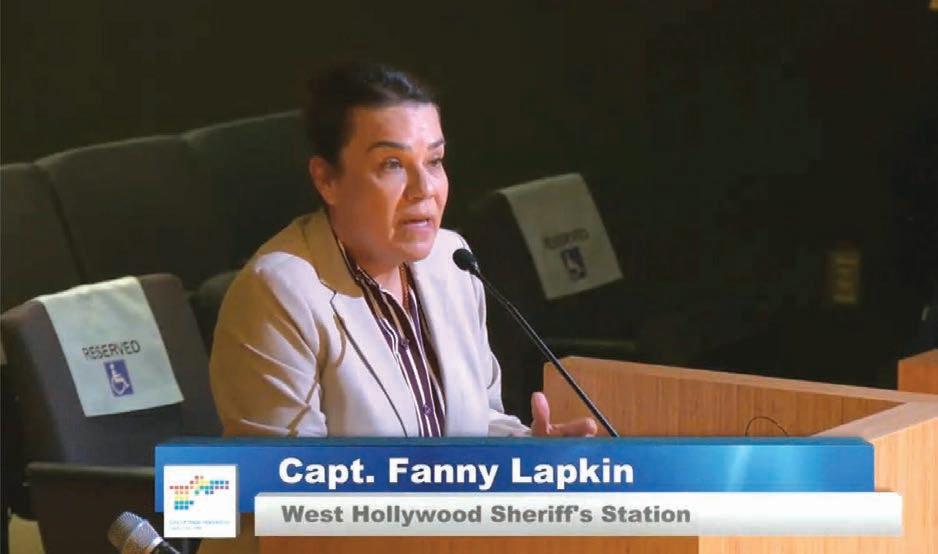
people are being kidnapped off the street by masked federal agents. There simply must be a better response to pickpockets and “other criminal activity” than undercover raids by masked officers and transporting detainees in unmarked vehicles. DO BETTER.”
Two days later, at the West Hollywood city council meeting, West Hollywood Sheriff’s Station Captain Fanny Lapkin took to the podium to address some of these concerns. Echoing the station’s Instagram statement, Lapkin confirmed that the “pre-planned operation” was created in response to “concerns from our businesses and our community in regards to the pickpocketing, to the narcotics, and also to the illegal vending and some of the criminal activity during illegal vending.” Lapkin also confirmed that no federal agents were present,
stating that everyone who took part in the operation was “sheriff’s department personnel.” And because the arrests were made as part of a planned operation, Lapkin further stated that warrants were not “necessary.”
The events were discussed with brevity at the meeting, but community ire has not been dispelled. Several people continue to question the ethics of this undercover operation: Why were the individuals being arrested not clearly told the reason for their detainment? Why were unmarked vehicles present? Why conduct the operation in this way, as Los Angeles neighborhoods continue to stay on high alert over immigration raids? These questions remain unanswered as more specifics about the operation have yet to be released.
KRISTIE SONG
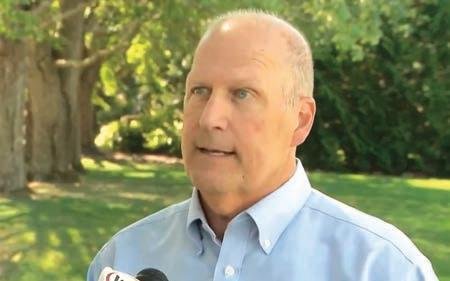
Former U.S. Sen. John E. Sununu last week announced he is running for retiring U.S. Sen. Jeanne Shaheen (D-N.H.)’s seat in 2026.
“Washington, as anyone who observes can see, is a little dysfunctional right now,” Sununu told WMUR in an interview the New Hampshire television station aired on Wednesday. “There’s yelling, there’s inactivity. We’ve got a government shutdown. Friends, family, they always say, ‘Why would anyone want to work there?’ And the short answer is it’s important to New Hampshire. It’s important that we have someone who knows how to get things done.”
Sununu, 61, was in the U.S. House of Representatives from 1997-2003 and in the U.S. Senate from 2003-2009. Shaheen in 2008 defeated Sununu when
he ran for re-election.
Sununu’s father is John Sununu, who was former President George H.W. Bush’s chief of staff. Sununu’s brother is former New Hampshire Gov. Chris Sununu. John E. Sununu will square off against former U.S. Sen. Scott Brown in the Republican primary. Gay U.S. Rep. Chris Pappas (D-N.H.) is among the Democrats running for Shaheen’s seat.
“As a small business owner and public servant, I’m in this fight to put people first and do what’s right for New Hampshire,” said Pappas on Wednesday on X. “I’m working to lower costs and build a fair economy. Washington should work for you — not corporate interests.”
MICHAEL
K. LAVERS
Douglas M. Haller (L) & Timothy H. Longnecker (R) became Married Partners September 15, 2025 at Ferndale, Detroit’s Gay-welcoming suburb, after 11 years as Domestic Partners in Midtown Detroit. Officiant Julia Music is Coordinator of Ferndale’s GLBT+ Pride celebrations. As vows they sang stanzas of the 1927 song Side By Side, concluding with an AI Gay Wedding Pledge— to be Allies pursuing happiness, equality & shared dreams.Their families hail from Detroit’s Old Redford neighborhood; Douglas’ Irish- & French-Canadian, and Timothy’s German & English—& DNA confirmed, each shares substantial ancestry from Ostrobothnia, Finland.
Douglas began his avocation as a Gay Cultural & Political Activist in 1971 by Coming Out in the Disco dance scene of Detroit’s Gay Palmer Park neighborhood. In Washington, DC after 1974, he was an Interior Designer at Georgetowne’s Little Caledonia boutique; & Co-owner of Hermes Antiques, with Helen Coutts, retired English Literature teacher from Redford H.S. On S St. at Connecticut Ave., D C’s first Pride celebrations were held in front of their shop, alongside Lambda Rising bookstore. Following victimization in an Anti-Gay Hate attack, Douglas became Gay Activists Alliance’s Public Awareness Coordinator, & principal organizer of its Anita Bryant Demonstration at Dupont Circle.
Returning to Detroit in 1979, Douglas achieved an M.A. in Ancient History & Archival Administration at Wayne State University (WSU), studying under Finley Hooper & Philip Mason; his Master’s Essay re: an American Labor Movement cartoonist, utilizing the Walter Reuther Library’s archives. His WSU 1973 B.A. included American Political/ Diplomatic History, & Interdisciplinary Studies. During 1979-82 he was Information Officer of ASP (Assoc. of Suburban People)— Metro Detroit’s largest Gay/ Lesbian social & political organization.
Relocating to San Francisco in 1982, Douglas was Curator of Photographs at California Historical Society Libraries in Pacific Heights, & Los Angeles. Living in the Mission & Haight, he was active in Castro & South-of-Market Gaylife, just as the HIV/ AIDS Epidemic first appeared.
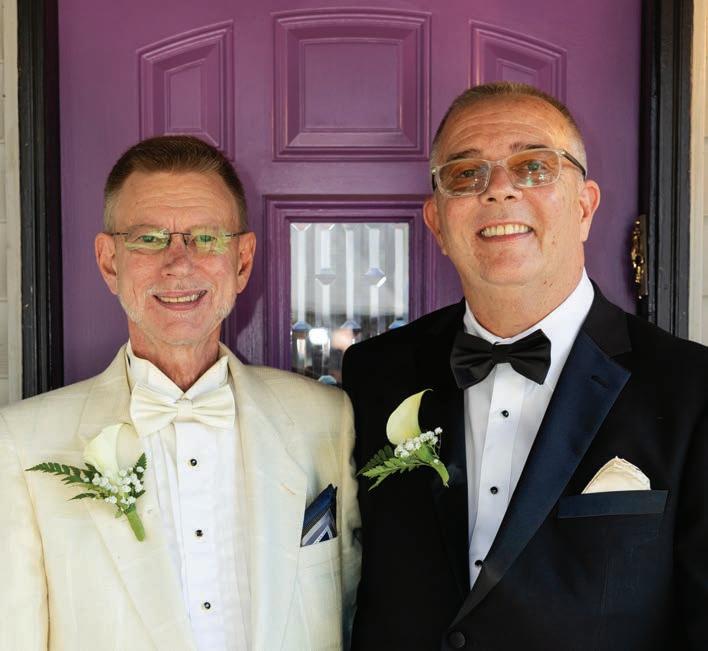
In 1986 Douglas relocated to Philadelphia, as Head Archivist of the Univ. of PA Museum of Archaeology/ Anthropology; authoring an illustrated book on Maison Bonfils, 19th-cent. French photographers of the Near East. Douglas was Founding Archivist of Penguin Place, now Philadelphia’s William Way LGBT+ Community Center. He became a Charter Member, Academy of Certified Archivists; and Founding Member, Lesbian/ Gay Archives Roundtable, Soc. of American Archivists (Chicago).
Returning to WSU’s Reuther Library (1998), Douglas was Coordinator of Audiovisual Collections, & History of Photography Instructor. Following 9/11 Attacks (2001), he relocated to New Orleans as Head Curator of Louisiana State Museums. Later owning the Gay-welcoming Creole Inn B&B in the Marigny (nr the French Quarter), with his finger on the pulse of Nawlins’ Gaylife—until Hurricane Katrina (2005). GLBT+ neighborhoods weren’t inundated—becoming lively islands amidst destruction. Douglas returned to Detroit in 2008 as caregiver for his mother, Jeanette Kalahar (Haller) Marchand, formerly a radio singer in 1940s Detroit. He met Timothy in 2014.
Timothy achieved a 1991 MBA in Finance & 1985 BS in Management Information Systems from the Univ. of MI-Ann Arbor. During 30 years he held Information Technology & Automotive Business positions in Metro Detroit & LA, including Partner at Deloitte & Touche, Ford Motor & IBM. As a Consultant his work involved extensive travel in North America, Europe & Asia. He has two married daughters from a previous marriage, a Pediatric Cardiology Nurse Practitioner & a Recruiting Executive for Automotive Technology clients, both living in Metro Detroit. As their final project before retirement, Timothy & Douglas worked as Archivist & Technology Consultant for Detroit educators Harriet (Choreographer) & Irving (Sculptor) Berg. Harriet acted as a godmother during their early relationship & they assisted in caregiving during her final years.
Timothy & Douglas spend their retirement in a 1905 apartment near the Detroit Institute of Arts’ exhibits, films & concerts, enjoying ethnic restaurants & traveling. In 2025 by train, to experience First Homosexuals 1869-1939 exhibition in Chicago; Jonathan Katz, curator, whose 1976 book Gay American History inspired Douglas to become a Gay Archivist.
The U.S. Supreme Court is set to consider whether to hear Kim Davis’s latest challenge to same-sex marriage — a case that, if accepted, could have major implications for LGBTQ rights in the United States.
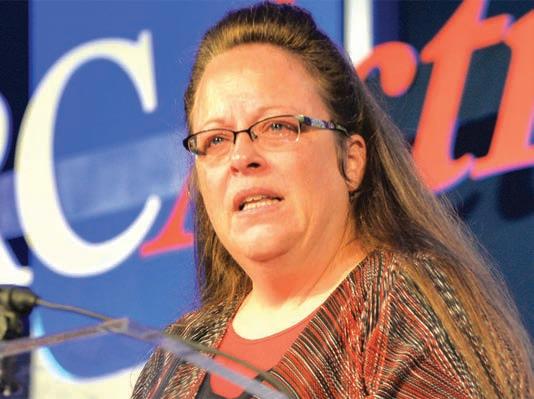
Kim Davis, the former county clerk for Rowan County, Ky., made national headlines in 2015 when she defied federal court orders by refusing to issue marriage licenses to same-sex couples — and later, to any couples at all. Davis, a Pentecostal Christian, said that signing same-sex marriage licenses would violate her religious beliefs, claiming protection under the First Amendment. When questioned at the time, Davis told reporters she was acting “under God’s authority” and suggested couples could obtain licenses in other counties.
Her refusal came just weeks after the Supreme Court’s landmark decision in Obergefell v. Hodges, which guaranteed same-sex couples the constitutional right to marry under the Due Process and Equal Protection Clauses of the Fourteenth Amendment. One of the couples who sought a license from Davis, April Miller and Karen Roberts, filed a federal lawsuit — Miller v. Davis — challenging her actions. Around the same time,
another couple, David Moore and David Ermold, also sued after Davis again refused to issue them a license despite a court order directing her to do so.
In Kentucky, marriage licenses bore the county clerk’s name and title — something Davis argued forced her to personally endorse a practice she found morally objectionable. It wasn’t until the state legislature changed the law in 2016, removing clerks’ names from marriage licenses, that Davis and her deputies resumed issuing them.
In 2023, a federal jury awarded Moore and Ermold $50,000 each in damages for Davis’s repeated refusals. Davis appealed the decision, but the 6th U.S. Court of Appeals upheld the verdict earlier this year. The court ruled that Davis’s actions were not protected by the First Amendment because she was acting in her official capacity as a government official, not as a private citizen.
“The Bill of Rights would serve little purpose if it could be freely ignored whenever an official’s conscience so dictates,” the court wrote, emphasizing that personal religious opposition cannot be translated into public policy.
Davis has now asked the Supreme Court to take up her case. Her petition, filed in August, argues that Obergefell “has no basis in the Constitution” and should be reconsidered. The justices are scheduled to review her petition in a private conference on Nov. 7, where they will decide whether to grant the case a full hearing.
Whether the court will take the case depends on whether at least four justices vote to hear it. Even if there are four votes to grant review, legal observers note that the justices would likely avoid taking up the case unless they are confident there is a fifth vote to overturn Obergefell.
Mathew Staver, Davis’s attorney, told Newsweek that Obergefell “has no basis in the Constitution” and could be overturned “without affecting any other cases.”
Legal experts, however, see such an outcome as unlikely. According to SCOTUSblog, while the case raises important questions about religious liberty and government authority, it centers on Davis’s personal liability rather than a direct challenge to the constitutionality of same-sex marriage itself.
Still, the case has reignited debate over the balance between religious freedom and LGBTQ rights — and whether the Supreme Court’s conservative majority might be open to revisiting one of its most significant civil rights decisions of the 21st century.
JOE REBERKENNY
A federal judge has ruled that federal anti-discrimination protections for transgender people in health care are unconstitutional, allowing legal discrimination in health care against trans individuals in the U.S.
Judge Louis Guirola, Jr., of the U.S. District Court for the Southern District of Mississippi sided with a coalition of 15 GOP-led states that sued over the rule, which broadened sex discrimination to include sexual orientation and gender identity in health care, the Hill reported.
The U.S. Department of Health and Human Services “exceeded its authority by implementing regulations redefining sex discrimination and prohibiting gender identity discrimination,” Guirola wrote.
The expanded definition of sex discrimination to include sexual orientation and gender identity was part of Section 1557 of the Affordable Care Act. The Biden-Harris administration implemented it to strengthen protections against health care discrimination for LGBTQ+ people. It previously prevented discrimination in health care services, insurance coverage, and program participation.

This is not the first time such protections have faced legal challenges. In 2016, the
Obama-Biden administration advanced similar rules to prevent health care providers from denying services — particularly gender-affirming care — that they would otherwise offer to other patients.
During President Donald Trump’s first term, those protections were reversed when his administration redefined Title IX protections to apply only to race, color, national origin, “biological sex,” age, or disability — explicitly excluding trans people.
In 2024, the Biden-Harris administration reinstated these protections, only for them to be struck down by Republican-appointed Guirola. Tennessee Attorney General Jonathan Skrmetti celebrated the ruling, saying in a statement, “This decision restores not just common sense but also constitutional limits on federal overreach, and I am proud of the team of excellent attorneys who fought this through to the finish.”
The decision comes as the U.S. Supreme Court recently heard arguments on banning so-called conversion therapy, and may soon take up a case involving the right to same-sex marriage.
JOE REBERKENNY

By MICHAEL K. LAVERS | mlavers@washblade.com
A gay married couple from Russia who has asked for asylum in the U.S. has been in Immigration and Customs Enforcement custody for nearly a year.
América Diversa, a group that advocates on behalf of LGBTQ immigrants, told the Washington Blade that Andrei Ushakov and Aleksandr Skitsan fled Russia on March 14, 2024, “after the government began labelling LGBTQIA+ organizations as ‘extremist.’” Skitsan “faced direct threats at his workplace, forcing them to flee for their safety.”
The State Department’s 2023 human rights report specifically notes a Russian authorities “used laws prohibiting the promotion of ‘non-traditional sexual relations’ to justify the arbitrary arrest of LGBTQI+ persons.” The 2023 report also cites reports that “state actors committed violence against LGBTQI+ individuals based on their sexual orientation or gender identity, particularly in Chechnya” and “government agents attacked, harassed, and threatened LGBTQI+ activists.”
Advocacy groups in August sharply criticized the State Department after it “erased” LGBTQ and intersex people from its 2024 human rights report. Immigration Equality and other organizations say this omission could jeopardize the cases of LGBTQ who are seeking asylum in the U.S.
América Diversa says Ushakov and Skitsan arrived in Mexico on March 15, 2024.
The men used the CBP (U.S. Customs and Border Protection) One app the Biden-Harris administration created that allowed them and other asylum seekers to schedule an appointment at a port of entry. Their appointment was on Nov. 27, 2024, and America Diversa said they asked for asylum on that day once they entered the U.S.
The Trump-Vance administration discontinued the CBP One app on Jan. 20, the day it took office.
“Upon entering U.S. custody, they (Ushakov and Skitsan) were separated without explanation,” said América Diversa.
Ushakov and Skitsan were initially detained at the Imperial Regional Detention Facility in Calexico, Calif., which is in the state’s Imperial Valley.
“Andrei was placed in an overcrowded unit with more than 60 detainees, where poor sanitation, excessive air conditioning, and the lack of adequate medical care have put his health at risk,” said América Diversa.
The group says the couple are now at the San Luis Regional Detention Center in San Luis, Ariz.
“They are now being denied all communication with each other, despite being legally married and sharing the same asylum case,” said América Diversa.

The group notes Ushakov has a “chronic medical condition that requires continuous medication and quarterly monitoring.”
“Despite repeated requests, he faces long delays in treatment and limited access to medical services,” said América Diversa.
América Diversa also noted Skitsan suffers from a “chronic ear infection, which causes ringing and tempo-
rary hearing loss, as well as untreated stomach issues.” América Diversa said Skitsan had been scheduled to see a doctor in December, but his “recent transfer to Arizona has jeopardized that case.”
“Their transfer to the San Luis Regional Detention Center has further worsened their situation,” said América Diversa. “At this new facility, they have been prohibited from communicating with each other, an act that violates not only basic humanitarian principles but also their rights as a legally married couple under both U.S. and international law.”
América Diversa Managing Director Yonatan Matheus on Oct. 22 told the Blade he had just spoken with Ushakov.
“He couldn’t talk with his husband, he was only able to talk with me for less than five minutes,” said Matheus. “The calls are recorded and monitored. He is very afraid to speak.”
The couple’s case are among those that have garnered attention since the Trump-Vance administration took office.
The White House earlier this year “forcibly disappeared” Andry Hernández Romero, a gay Venezuelan makeup artist who asked for asylum in the U.S., to El Salvador. He returned to his homeland in July after he spent more than 100 days in El Salvador’s Terrorism Confinement Center, a maximum-security prison known by the Spanish acronym CECOT.
ICE agents in August arrested Alice Correia Barbosa, a transgender Brazilian woman, while she was driving her car in Silver Spring, Md. A senior Department of Homeland Security official who misgendered Correia told the Blade that she “overstayed his visa by almost six years” and DHS plans to deport her.
Brazil has the highest number of reported murders of trans people in the world.
ICE did not respond to the Blade’s request for comment about Ushakov and Skitsan’s case.
I never imagined that fleeing my own country would not free me from fear. Yet, when I left Uganda, the place of my birth, my memories, and the source of both joy and pain I believed that the hardest part of my journey was behind me. I was wrong.
I had lived under the weight of persecution, where being queer was not only condemned but criminalized by laws and reinforced by the religious and cultural doctrines that shaped daily life. Every glance, every whispered insult, every hushed conversation reminded me that the very core of who I am was treated as a threat. In the end, I had no choice but to flee.
I arrived at Kakuma Refugee Camp in northern Kenya with hope in my heart, imagining that safety and relative freedom awaited me. Kakuma is one of Africa’s largest camps, home to hundreds of thousands displaced by conflict across the region. But what I found was a different kind of cage: the cage of silence. The fear I carried from Uganda followed me, threading itself into my interactions, my movements, my very breath. “You cannot say who you are,” a fellow refugee whispered one night as we huddled in the corner of a tent. “Even the walls have ears.”
For LGBTQI+ refugees across East Africa, silence is of-
ten the only shield against violence. But silence is also a heavy burden. In Kakuma, Malawi’s Dzaleka Camp, and Zambia’s Meheba settlement, we live in a constant negotiation between visibility and invisibility, between survival and authenticity. The promise of freedom is only partial; the moment you speak your truth, the risk of reprisal is real from fellow refugees, from camp authorities, and from the broader legal and social systems that criminalize us.
Freedom of speech is not merely the right to speak about politics; for us, it is the right to exist openly, to report threats, to seek help when we are attacked, and to be acknowledged as human. But in countries where samesex relations are criminalized, even reporting a threat can become an act of extreme risk. Arrest. Deportation. Beaten for daring to ask for safety. Silence, then, becomes both our protection and our punishment.
In Kakuma, I have seen friends beaten for holding hands with someone of the same sex, harassed for wearing clothing that did not “fit” traditional gender expectations, and denied essential aid because our identities are deemed illegitimate. We are told to stay quiet, to blend in, to survive in shadows. And yet, survival in silence is a
constant reminder that our rights exist only on paper.
The tension between hope and hostility is a daily reality. Humanitarian organizations like UNHCR and NGOs such as ORAM and Rainbow Railroad provide critical interventions, but safe spaces are limited and often inaccessible. Even interpreters people meant to help us navigate the bureaucracy of aid can inadvertently “out” us, putting lives at risk. Attempts at advocacy, such as peaceful marches within camps, are met with hostility, detention, or social ostracism.
Malawi and Zambia offer a similar narrative, albeit in different hues. In Dzaleka Camp, Malawi, LGBTQI+ refugees live largely underground, avoiding clinics or services for fear of ridicule or exposure. Even when protections are formally recognized, they are often overridden by national laws or local social norms. In Zambia, settlements like Meheba and Mantapala host tens of thousands of refugees, but restrictive legal frameworks and growing public hostility force many queer individuals to remain silent, invisible, and isolated.
Continues at washingtonblade.com.
(Abrina lives in the Gorom Refugee Camp in South Sudan.)





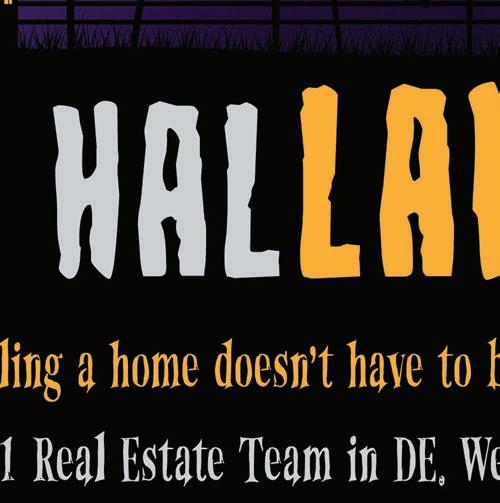



































is a Maryland communications strategist with experience in multiple presidential campaigns.
They must reflect the best of who we are: brave and inclusive
Integrity matters in our queer community. Many of us know what it is like to hide parts of who we are just to stay safe, to edit ourselves, to shrink, to survive. Because of that, honesty means something deeper to us. We know what it costs. Integrity is not a luxury; it is how we stay whole. When we ask our leaders to act with integrity, we are asking them to live by the same truth we have had to live by ourselves.
Across the country, in cities and hometowns, something troubling is happening. Some of the leaders who once gave us hope are now staying silent, or worse, while trans kids are being attacked by cruel laws and political games. Some elected officials say queer leaders have told them not to fight for things like Pride flags or rainbow crosswalks, calling it “smart politics” when really it is fear and moral failure.
Some people in our community are blurring the line between public service and personal gain, using the trust of queer people to advance their professional standing. Others, unprepared for the seriousness of our moment, keep rolling out surveys and “listening sessions” as if paperwork could replace leadership, while their inaction compounds the real hurt queer folx are experiencing.
These are not small mistakes. Together they show something bigger: a loss of accountability among people who are supposed to protect and defend our full community.
Queer and trans people are facing organized attacks across the country. In schools, libraries, and statehouses, our rights are being stripped away. This is not the time for quiet or calculation. Leadership right now is not about being seen; it is about showing up. When people in power stay quiet, it is our most vulnerable who pay the price. Trans kids are left isolated. Queer parents and families are left unsupported. Our trust is broken.
We need courage, not calculation. We need solidarity, not silence.
Queer leadership is extraordinarily hard work. It means facing public hate, navigating tough politics, and carrying the hopes of a community that is used to being disappointed. Many of our leaders are trying their best under tough conditions, and that matters. Anyone who steps forward to advance queer issues deserves our sincere praise and our utmost gratitude.
It’s also important for us to remember our leaders. Being a leader does not mean being perfect. It means being responsible. When someone makes mistakes, accountability is
how they rebuild trust. It is what separates real leadership from self-promotion, and community service from personal ambition.
Leadership is not a prize for popularity. It is a responsibility. It comes with privileges like access, visibility, and influence, and those privileges come with limits. You cannot use them to exclude people. You cannot put your comfort ahead of your community’s safety. And you cannot hide behind endless bureaucracy when what is needed is action.
I cannot stress this enough, every queer leader deserves our appreciation for stepping up. And it’s appropriate for that appreciation to come with expectations. It is how we keep our movement healthy and our leaders honest. We can be enthusiastic about someone’s work and still provide them with the tools and coaching to do better. Avoiding accountability weakens trust. Facing it makes us stronger. A community that can be honest with itself is one that endures. In this context, we each have a heightened responsibility to inclusion. Our movement is built by people who were told they did not belong. Doing that same harm to others is not leadership; it is betrayal. Real leaders open doors wider and when necessary tear them off the hinges.
Accountability in action means being clear about decisions, standing up for trans youth and other vulnerable people, and taking action instead of just talking. It means welcoming disagreement instead of silencing it. And when harm happens, it means owning it and making it right. None of this is easy. But nothing about compound liberation ever will be.
It is being hopeful. It means believing that our leaders can do better, and that our movement deserves honesty and integrity. We can support our leaders and still expect courage. We can appreciate their work and still demand they act with principle.
The queer community has never been built on comfort or convenience. It has been built on truth telling, to power, to each other and to ourselves.
Leadership is not about being beyond criticism. It is about being worthy of trust.
When we hold our leaders accountable, we are not tearing our community down. We are protecting it. Accountability is how we honor those who came before us and how we make sure queer leadership reflects the best of who we are: brave, inclusive, and unapologetically ourselves.
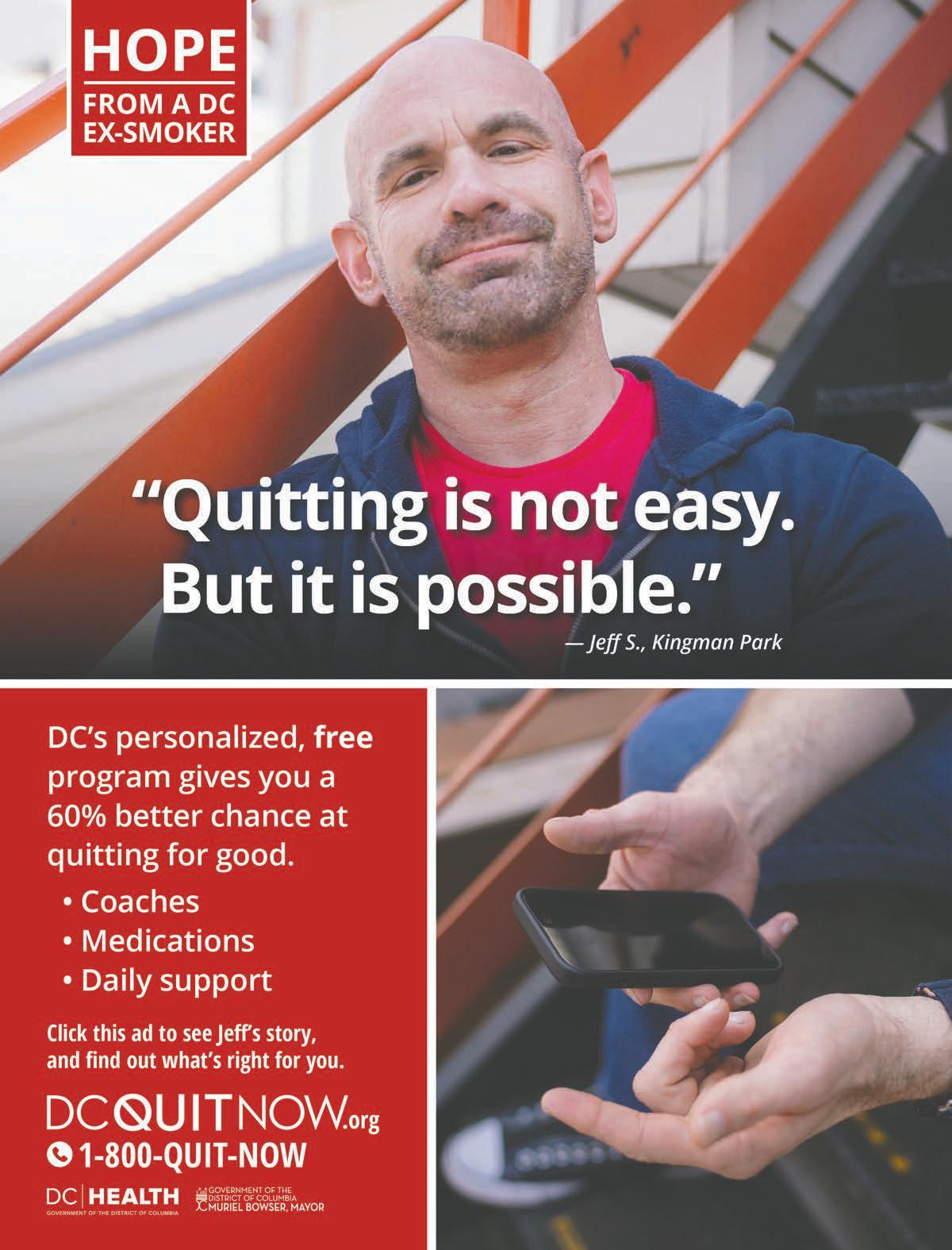
NicholasF. Benton
FALLSCHURCHNEWS-PRESS

Of n ote is the sad pa ss in g thi s w ee k atage 70of Bj orn A nd res en , w hoatage 15was an inte r nati o nall y acclaime d tee n s ta rof thecla ss ic 1 97 1artf ilm by Lu ci n o Vis co n tiba sed on N obe l Pr ize -w i nn erT ho ma sM an n’aut ob io gr a ph ical nov ella ,D eat hof Ven ice. Thest or ywas abo utan obs e ss i on an o lde r ma n deve lop ed for ab eauti f ultee nage bo y heencoun te r ed onav acation in 19 11.
An dresen’s li fe pea kedw it h th at pe rfor mance. Hewas ea te n, meta ph or icall ys peaking , at th at ag e, aswas thecha racte rhep or tray ed in the m ov ie , theyo un gTadzi o, whowasa r eal - li fe pe rs onthat G ilbe rt Ad ai r wro teab ou t in his2 00 1 book ,The Real Tadzio: Th oma s Ma nn ’sD eathin Veniceandth e B oy Who Ins pi r ed I t. Itwasa mi ni -b i ogr ap hyof o neWlady sla w (Ad zio ) Mo e s, the r eal boy who i nsp ir ed M an n’s cha r acte r of Tadzi o.
Be for epa ss in g, An dr es en vocalized hisb itte r ne ss ove r bei ng c hos en andallege d lyexploite d by Visc on ti for ther oleinth e f ilm,an de xpr e ss ed it t hro ug h a20 21 d ocumenta ry entitle d, The Mos t Beauti f ulBo y inth e Wor ld .He claime dinin te rv ie ws fro mfo ur y ea rs ago in thed oc ume n ta ryth at Vis co n ti ’s pa rad in g h im a rou nd as the wor ld ’s “mo st b ea u ti fu lboy”top ro motehi s f ilm h ad a prof o un dly neg ati ve im p act on the res t o f hi s li fe.
An dresens pe nt hi s ad u ltli fe asaS tock h olm -b as ed vio li nist who rar el y an dbar elydabble d inmo vie s.Ther eal Taz dio (Ad zio ), bo rntoanP oli sharistocr atic f amil y,grewuptof ig ht inthe 19 19 Po li sh -S oviet war, a ndsu ffer the trav ail s of bein g inP ola nd in1 939 w hen Wor ld War IIbrok eou t, jailed for a h al f- dozenyea rs by the N azi s a nd th en distrus ted a nd clo s el y m on ito redbytheS oviet saf te r thewarfortherest of hi s li fe. Ad ziobecame awareofthe1 97 1 f ilm and it s depicti onof him , bu to nly r ecalled th at“an old ma ns ta red at h im w he reverhe wen t that s umme r i nVenice. ”
Inb othca ses,of Bjo rn an d ofA dzi o,w hatbecame of thei r li ves, compa r edtothe r el ati ves plen dorof thei ryo uth s, was nothin g com par ed to tho se yo u nge ry ea rs While M an n wro tetheno v ella as theca seof a cla ss icalcomp os er’su nr elen tingde s centintoob se ss ion w it h beautyeven w it hs ome s atani c sy mb oli s m, am or e unive rs al appr eciati o n, asI wro teab out itin the Be r keleyBa rb in1971 , co uld bef ou nd fr omthe s tan dpoint of theju st-awak ening Gay Libe r atio nmo vement of tha t da y.
The pr edicame ntof the f ilm , I wro te, wasthe inability o f th e olde r man , thecompo serGus ta v Von As chen b ach s ub s titutin g fo r theautho rin the n ovel (s om e sayM annba s edthecha r acte r on the co mp os er Gus tav M ahle r, w ho sem us ic p lay s th r oug h ou t the f ilm, es peciall y the ad ag ietto fr omhi sFifthS ymp h ony ), to co mm u nicate w iththeyou nger, the f actthatheneve rs ay s awordto himto the ve ry end Ther ea s on was thelack ofa la nguage of gayli ber atio n,I wr ote , ofawayforVon As chenbac h toadd re ss hi s de sire to provide for theyo u th a path w ay forhis li fe toavoidthepit f all s of dull , mundaneadultho o d, w hich is r eally w hathe was motivate dto do . As I late r wr oteinmyco llection of e ss a ys , Ext r ao r dina ry H ea rts( 20 11), it wasasifthe ladlo o kedbackat Von As che nbachand s ilentl yas ked, “ Ar en ’t yo u g oin g to s ave me? ”
We cannot preventour aging, exceptin our minds, our brains. Inour minds,weretainthe capacity to be foreverrenewedand young. Ourbrainsare ourcompatibility withtheentirety of creation, each ofuswith as many neurons as therearestars inour galaxy. The sole aspect of our brains that are visibleinourappearance are our eyes. They remain young as the rest of us age.
Themo st compelli ngs ce ne of the f ilm, Titanic ( 199 7) is w henthecame ra cl os edin on theeye softhe he r oine p la yed by K ate Win s let,Ro se atage16 , and then p ulledback on them to sh ow Ro se at age100asp laye d by G lo r ia Stuar t.Whileeve ry a sp ect of the he ro ine’s appea ran cechan g ed, the eye sr emai ned the s ame
Sow ithou r mind s,oursouls. Retainin ga yo u th f ulze stfor li fe is o ur pr eciou s , lovely gi ft.

is a longtime LGBTQ rights and Democratic Party activist. He writes regularly for the Blade.
13 nights away from the chaos of American politics

I am off on another transatlantic cruise. When friends ask, “Where will you be stopping?” I often have to look it up, as the stops are often less interesting to me, than the sea days that I love. On Celebrity, the stops are often the same year after year. This year I will board the Celebrity ASCENT on Halloween, Oct. 31, in the port of Civitavecchia, about an hour and a half outside of Rome. It is the same ship I cruised on last year out of Barcelona, so it’s sort of a homecoming. It is a beautiful ship, and I will be sailing with about 65 old and new friends who also book their cruises each year through my friends, Dustin and Scott, of My Lux Cruise. They have now added Samantha Basar to their team, as their business is growing. Many of those who will be on the cruise I see only once a year, so it is always great fun to catch up. Scott and Dustin host a sail-away party the first evening, in the ship’s Iconic suite, so we all get a chance to reconnect and meet any newbies.
Before boarding the ship, I will spend a couple of days in Rome. It is a city I love, and to which I have been often. My first visit was in 1968, during my first European trip. I was last there in 2023. Rome is a wonderful walking city. This year I will be staying at the Hotel Nord Nuova Roma, near the main train station. I can walk from there to all the tourist spots, including the Trevi Fountain, the Spanish Steps, the Coliseum, and the Pantheon, among others. This year I will go to the Basilica di Santa Maria Maggiore, where Pope Francis is buried. I found him to be an interesting Pope who seemed to move the church forward a little with regard to the LGBTQ community. Clearly not far enough, but even little steps are important. And they somehow seem ever more important today, as we have a felon in the White House who is taking us backwards. This year I will be spending 13 nights on the ship. The nice thing is there will be 10 sea days, with only three stops planned. Celebrity saves money by not having to pay port fees. The stops include Cagliari, in Sardinia, on day two, and I have a tour booked there; then Gibraltar, and Bermuda. I might actually stay on the ship in Gibraltar, as I have seen the monkeys before. Bermuda is always beautiful. So, I was thinking about what to do for some of my time onboard. I am always up early having coffee delivered to the room by 7 a.m., and then spend a couple of hours writing before heading to the gym. This year my plan is to begin my second book. I enjoyed writing my memoir, “Born this Gay: My Life of Activism, Politics, Travel and Coming Out,” which is still available on Amazon (that’s a plug). Since I don’t think I could write a novel, my thought is to write about politics. Something I do for the Blade nearly every week. The tentative title is: “From Camelot to Fascism, in 65 short Years.” I will be writing from my perspective, and my politics, over those years. Those who read my memoir will remember I heard Dwight Eisenhower speak when I was 13, at the 25th Boy Scout Jamboree in Colorado Springs. On the bus trip from New York, I listened on my transistor radio to JFK give his acceptance speech at the 1960 Democratic convention, while sleeping on the floor of the gym at Washington, University, in Saint Louis. Both our country and I have come a long way since then.
As always, I will also be writing a blog from the ship, and Kevin Naff, the Blade editor, has been kind enough to say he will publish it online. So I hope you can enjoy some of the cruise with me. Maybe it will even entice you to join our group next year, when on Oct. 23, 2026 we set sail for 16 days, from Barcelona to Miami, on the new Celebrity XCEL, which goes into service this year.









‘Becoming Ourselves’ proclaims that our lives are ‘expressions of divine creation’
By EMMA CIESLIK


Gwen Andersen was putting up posters for her photography exhibition “Becoming Ourselves” in and around Takoma Park shortly following the death of Nex Benedict. “Everybody’s heart was heavy,” the lesbian photographer said, “and I’m waltzing around town putting up these posters.” At a bookstore, she asked the person working at the front desk if she could put up one of the posters. They immediately looked at it more closely because of the trans flag, and said yes.
“When they read it and saw that it was something positive, beautiful, happy, they started to cry,” Andersen said, and she instinctively asked if she could give them a hug. With permission, she walked around the counter and embraced them — and in many ways, herself — in a world where negativity and violence takes aim at and harms the LGBTQ community. It was a powerful moment, she admitted, because “the first person didn’t even see the pictures.”
“That’s when I realized.” she said, “just how the idea of this is making an impact.”
“Becoming Ourselves” is an exhibition of 26 photos featuring happy and joyful trans and nonbinary adults and children that has been displayed at six different spaces of worship and one gallery in Maryland and Virginia. From the United Universalist Congregation of Rockville (UCCR) to its eighth spot that opened at the Sandy Springs Meeting House on Oct. 1, the exhibition originally started after Andersen’s friend Marian Bowden connected her with Sandra Davis, then president-elect for the Women’s Caucus of Art. Davis, seeing that Andersen had something critical to say during a time of intense anti-trans violence, became her mentor.
Andersen decided to host the exhibition at the UCCR based on the suggestions of her friend Rev. Jill McCrory, an affirming pastor and justice advocate, who along with Stevie Neal had previously invited Andersen to help found Montgomery County (MoCo) Pride. McCrory recommended UCCR and Davis shared that the church had their own hanging system, but for Andersen, their eager acceptance of the show sealed the deal.
“They were so happy to have been asked,” Andersen said. “They weren’t just consenting. They were wildly enthusiastic about it. I could not have had a better first place to host this.”
Rev. Dr. Rebekah Savage echoed this affirmation. Andersen approached her in October 2023 and from the very beginning, Savage acknowledged, we knew it would be
a vital gift to congregants. Showcasing queer and trans people in spaces of worship, as the portraits hung in the Sanctuary during Sunday morning worship for Transgender Day of Visibility is critical, Savage explained, and it “does more than challenge exclusion,” Savage said. “It proclaims to the world that LGBTQ+ lives are sacred, beautiful, and an essential expression of the divine creation.”
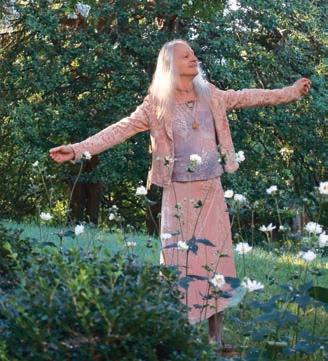
“This visibility is both healing and life-saving, especially right now: for trans youth and families who need to know that there are faith communities ready to celebrate with them fully,” Savage continued. “Becoming Ourselves,” she said, visualized the leadership of our trans loved ones and held space for joy and celebration during times of intense violence. It has, Savage said, “become a beacon of hope, within our congregation and beyond, witnessing to the power of love, equality, and justice as sacred commitments.”
But there was a time crunch — the exhibition would open in March 2024, so all photos had to be taken by December 2023 and to her surprise, there was great interest in being part of the project. She had taken some photos already, but when a friend’s child asked if their friends could be part of it, they realized they would need extra enforcements to get the photos taken and processed in time for printing, so she connected with Salgu Wissmath, a nonbinary photography who recently opened their own exhibition “Divine Identity,” and other photographers from Los Angeles, London, and Baltimore.
She also reached out to Natasha Nazareth from Gaithersburg and Elias Nikitchyuk who worked locally and contributed photos to the exhibition.
She also brought a child — Emery — on as
the Formal Youth Adviser, recognizing that the show’s most important audience would be trans and nonbinary children. The resulting 26 photos of joyful trans and nonbinary adults and children were chosen by LGBTQ young people from across the United States who shared their selections through a virtual survey, and the group just made the tight deadline. Sadly, Stevie (a nickname for the beloved Petra Stephanie) Neal passed before the project was put on display, but their estate covered photography printing costs.
Soon, the UCCR was filled to the brim with photos of happy and joyful trans people. While UCCR has designated a room for its display, there were too many so the photos spilled out into the hallway, entryway, and anywhere else they would fit. It was only the first of many surprises.
She anticipated just displaying the show at the church in Rockville, but at the opening, McCrory shared that she would love for the show to be on display at Bethesda United Church of Christ (UCC) where she was then and is now working as an interim pastor, so it went to Bethesda UCC next, but that wasn’t its final stop as church members attended other parishes, they shared that they wanted the photos displayed in their own spaces of worship, and soon the photos had travelled to Christ the Servant Lutheran Church in Gaithersburg, Pilgrim Church in Wheaton, Hope United Church of Christ in Alexandria, PhotoWorks at Glen Echo, and finally, Third Space in Baltimore — its most recent stop at the recommendation of one of the photographers. A friend of Octavia Bloom, a Baltimore photographer, wanted the show to come to their hometown.
The exhibition at Third Space came to an end on Aug. 8, but as before, another church —this one Sandy Springs Meeting House — stepped up to host the show. The brick Sandy Springs Meeting House was originally constructed in 1817 and has stood ever since, making the Sandy Spring Meeting of the Religious Society of Friends one of the oldest Quaker Meetings in Maryland. Sandy Spring just put up their hanging system, on loan from a local artist, this month and aims to have the show on display to the public soon.
For some, the choice to display the exhibition in churches may seem like a strange or at least surprising one, but for Andersen, it was a meaningful choice. For Andersen, it helps counter the narrative of churches being places of hostility and part of campaigns against us. While recognizing the history of harm that churches and other religious in-
stitutions have caused through conversion therapy, exclusion, hate speech, and more, Andersen’s exhibition showcases how spaces of faith can also be key centers of LGBTQ advocacy and organizing. In fact, D.C. has a rich history of LGBTQ activism based out of and supported by faith communities.
“The fact that it was held in a church made so many people so happy. It also made many people cry because the church has been a place of hostility because the resistance, the hatred, of lesbians, gays, bis and transgender people has been biblical, both in terms of its size and in terms of its purported origin, and so having churches hold this exhibit was dearly important symbolically,” Andersen said.
Andersen shared that so many friends of hers who came to the show had not visited churches in decades because they (justifiably in some cases) viewed them as completely hostile locations. When they went to the exhibitions in the churches and were treated well, she said, she believes it was a healing experience, as it was for many trans and nonbinary children and adults and their parents who are facing a world of negative representation — either hostile from conservative, Christian nationalist groups or media portraying trans and nonbinary people as victims.
Andersen wanted to create a show that offered hope to trans and nonbinary kids, as It Gets Better did many years before. sharing videos and photos of happy and joyful LGBTQ adults as a way to share positivity and hopefully prevent suicide among LGBTQ children. It was more than timely than ever following Benedict’s death in February 2024. The previous day, Benedict was assaulted by other high school students in a girls’ restroom and later died by suicide.
“The purpose of the show was to counter all of the negativity because with Republicans running and now Trump in office there was so much animosity and hostility and people trying to pass these hateful laws that I knew this had to be having a negative impact on the mental health of trans kids.”
Andersen hopes that this exhibition enriches this rich tradition and sparks new conversations — and maybe even more happy tears — at Sandy Springs Meeting House this fall.
The show will be open most days between about 10 and 4 except for Mondays and Saturdays. Viewers are advised to call Sandy Springs Meeting House at 301-7749792 first on weekdays. The show will continue until the end of December.

MASON ARTIST-IN-RESIDENCE
Limón Dance Company
FEATURING STUDENTS OF GEORGE MASON SCHOOL OF DANCE
Saturday, Nov. 1 at 8 p.m.
Witness one of the world’s greatest modern dance companies
Saturday, Nov. 8 at 4 p.m.
A supercharged urban circus!
MASON ARTIST-IN-RESIDENCE
La Santa Cecilia
Saturday, Nov. 15 at 8 p.m.
This Grammy-winning ensemble presents a colorful performance of Pan-American rhythms
Sunday, Nov. 16 at 7 p.m.
“A dazzling, captivating force to behold” (Telgraph)
VIRGINIA OPERA
Cinderella
November 22-23
Rossini’s beloved retelling of the classic fairytale
Chanticleer
A Chanticleer Christmas
Saturday, Nov. 29 at 8 p.m.
“The world’s reigning male chorus” (New Yorker)


By TINASHE CHINGARANDE
Halloween weekend is here, and here’s a list of just some of the local events if you’re looking to have a spooky good time.
GoGay DC will host “LGBTQ+ Halloween Party” on Friday, Oct. 31 at 5 p.m. at Freddie’s Beach Bar and Restaurant. This is an opportunity to mingle with LGBTQ folk and allies. Halloween costumes are encouraged or casual beach attire is fine. Attendance is free and more details are available on Eventbrite.
Mixtape Sapphics will host “Bad Witch, Good Butch: A Sapphic Halloween Dream” on Saturday, Nov. 1 at 4 p.m. at Revolt DC. This is a halloween party for sapphics from the ages of 35 and above. There will be costumes, connection and dancing. Tickets are $13.26 and can be purchased on Eventbrite.
Taste Takeover will host “Abuela Halloween Party” on Friday, Oct. 31 at 8 p.m. at 639 Florida Ave., N.W. DJ Yani will play music and there will be a costume contest with prizes to be won. Tickets cost $17.85 and can be purchased on Eventbrite.
Metro Cabaret Club will host “Spookshow Spectacular: Dance Place After Dark Halloween Party” on Friday, Oct. 31 at 9 p.m. at Dance Place. This is D.C.’s Halloween nightlife and draglesque showcase, featuring live performances, creative marketplace, and costumed revelry. For more details and to purchase tickets, visit Eventbrite.
Punch Bowl Social will host “Halloween Bash” on Friday. Oct 31 at 9 p.m. at Punch Bowl Social Arlington. This will be a night of hauntingly good times with a killer DJ, vendors, and a costume contest. Tickets cost $12.09 and can be purchased on Eventbrite.
Thrust Lounge will host “Nightmare on 14th St.” on Friday, Oct. 31 at 5 p.m. DJ Tryfe will play music, and there’ll also be a costume contest with prizes. For more details, visit Thurst’s Instagram.
Nellie’s Sports Bar will host “Halloween Scariest Costume Contest” on Friday, Oct. 31 at 10 p.m. Guests are encouraged to bring their scariest, creepiest, most haunting look for a Halloween night they won’t forget — fueled by Casamigos and Nellie’s signature spooky fun. For more details, visit Nellie’s website.
Kiki DC will host “Kiki’s Halloween Costume Contest” on Friday, Oct. 31 at 10 p.m. This event will be hosted by Pirouette and there’ll be prizes for the top three costumes.


For more details, visit Kiki’s Instagram.
Sinners and Saints will host “Heaven’s On Fire (Queer Pop Dance Party)” on Friday, Oct. 31 at 9 p.m. There will be two floors and music by Sonali Dawar, DJ Noons and Aria McIntosh. There will also be drink specials all night.
Crush Dance Bar will host a Halloween costume contest on Friday, Oct. 31 at 11 p.m. Drag queens Empress Lena and Sasha Adams will host the event. For more details, visit Crush’s Instagram.









‘Music and humor set against the rhythm of a cutthroat game of spades’
By PATRICK FOLLIARD
For Reggie D. White, growing up Black and queer in the late 1980s and early ‘90s, there wasn’t a lot of vocabulary for his experience outside of the AIDS crisis. Despite being surrounded by family who loved him, White felt isolated in his own home; there was a sort of membrane that prevented him from being present.
With his new play “Fremont Ave.,” now running at Arena Stage, White has written a work about home and the many definitions of that idea specifically relating to three generations of Black men.
Set in a house on a street in a Southern California suburb (similar to where White grew up), “Fremont Ave.” explores the ways a lack of belonging can be passed down generationally. The first act is boy meets girl and creating a home; and the second watches the next generation struggling to achieve something different.
“The third act’s storyline is deeply queer,” White explains. “Boyfriends Joseph and Damon
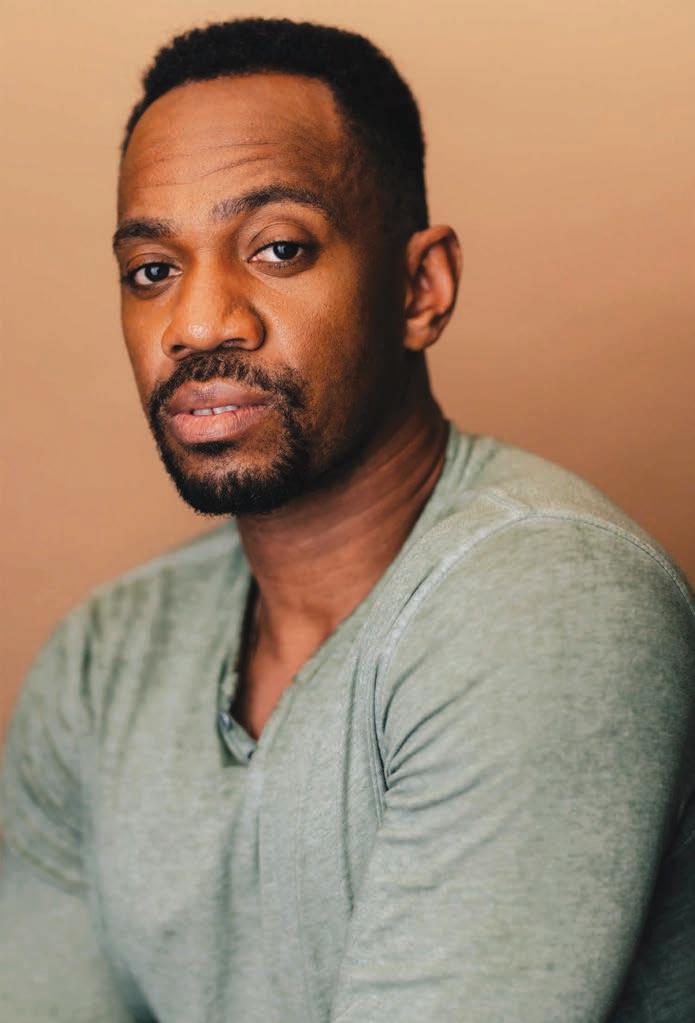
have been together for years yet can’t figure out what it means to make a home. We don’t totally see the relationship solved, but there’s a glimmer of hope that it just might make it.”
The playwright notes, it’s not all about familial angst and alienation: “Much of the play is music and humor set against the rhythm of a cutthroat game of spades.”
Playwright, actor, and educator, White “does all the things.” Currently, he holds the title of Arena’s senior director of artistic strategy & impact, a role focused on artistic vision and growth. Superbly energetic, White splits his time between Arena and his prized rent-stabilized residence in Brooklyn’s desirable Park Slope neighborhood. He’s already told his landlord that he’s never leaving.
At seven, he came close to landing the part of young Simba in the pre-Broadway “Lion King.” Soured by the near miss, White turned his attention to sports and studies. In his freshman year at college in the Bay Area, he took a musical theater class for the heck of it, and soon gave up law school ambitions to focus on show biz. He went on to appear in Matthew López’s Broadway success “The Inheritance” until the pandemic hit.
Winning the Colman Domingo Award in 2021 gave White the flexibility to write “Fremont Ave.” (The award is given to a Black male or male-identifying theater artist and includes a cash stipend and development opportunities.)
“It can be scary to make a career in the arts. I ran from it for a long time. Then one morning I just woke up very grateful for the accumulation of accidental circumstances that landed me in this moment.”
WASHINGTON BLADE: Is queerness your secret to success?
REGGIE D. WHITE: I’m not saying that being queer is my mutant super power, but I do think there is an element of living my life on the margins trying to find a place for myself that I’ve been able to observe relationships and how people engage and interact with each other that gives me a real objective eye on how to render a world that I didn’t live in.
BLADE: What’s queer about your work?
WHITE: There’s this thing that James Baldwin said a lot, it’s about being on the outside of an experience, being able to observe more astutely. With “Fremont Ave.” it felt important to me that the actor leading us through is played by a queer actor. I wanted that authenticity and that experience of having felt isolation.
It’s unique that the central man in each story, the grandfather, stepson, and grandson are played by the same queer actor Bradley Gibson, that amazing TV star with the big muscles. It’s also interesting to watch a single body traverse over generations in the same house (altered over time by appliance and art updates).
BLADE: Premiering your play as part of Arena’s 75th anniversary season must be a thrill.
WHITE: Sometimes I ask myself, how is this happening? And I didn’t even have to sleep with anybody. But seriously, I’m lucky. Arena excels at taking great care of world premieres, and the production’s director Lili-Anne Brown has a visceral sense of how to create community and life on stage.
BLADE: What else is unique about “Fremont Ave.”?
WHITE: Men aren’t a particularly emotionally literate species, so there haven’t been a lot of plays exploring the emotional condition of men and what it means to learn to love.
For men, love looks like silence. I wanted to explore what it looks like when there’s a deep curiosity about the people we’ve known and loved.
BLADE: Was risk involved?
WHITE: I wrote a deeply personal play. That’s scary. So, to see everyone involved invest their own love into what’s my play, that’s incredible, and a great confirmation of “specificity is the key to universality.” People seeing themselves in the characters has been both beautiful and surprising.
‘Fremont Ave.’
Through Nov. 23 | Arena Stage | 1101 Sixth St., S.W. Tickets start at $49 | Arenastage.org




COOKIES, the world’s most popular cannabis brand - has planted its flag on U Street -




Inspired by U Street’s rich history of musical innovation and the diversity of its residents.
Like music, cannabis transcends differences. It is one of the few things that bridge race, religion, politics, gender and sexuality.
Cookies DC is a celebration of what unites humanityA hub of culture, learning, healing and inspiration.
All products are lab tested, fully-legal, and locally sourced from licensed producers.






In DC, all cannabis is considered medicine, but no doctor’s visits are required.



By EVAN CAPLAN
For 75 years, along the 17th Street corridor that has long been a bastion of LGBTQ social and cultural life, Trio Bistro and Fox and Hounds Lounge have served customers. On Nov. 2, these two mainstays will close their doors.
Owner Mourad Menjelloun wrote that, “For decades, Trio has been more than just a restaurant; it has been a second home for so many of us, both for our guests and our dedicated staff. Our team is a family, and many have spent decades building the connections and community that made Trio so special.”
Although the owner was not gay, both businesses became a safe space for many LGBTQ locals, similar to Annie’s Paramount Steak House, also located on 17th Street. Many LGBTQ social and professional groups used Trio as a meeting place to plan activities and hold events.
Trio Bistro and Fox and Hounds share a kitchen, though they have two separate dining areas. Trio,
located on the corner of 17th and Q streets, N.W., is known for its diner-style fare and huge red-andgreen neon sign advertising “good food” above the door. With two covered patios wrapping around on both streets, Trio was known for its burgers, steaks, pasta, and other all-American entrees. It was also well-known for brunch, bringing in social sports teams, longtime friends, and groups discussing the previous night’s activities.
Fox and Hounds, right next door, was a more relaxed, bar-focused space. Its large, social patio attracted those who live in the neighborhood and people from outside, for the long happy hour, the people watching, and the casual atmosphere. Customers especially were drawn to the digital jukebox and 80-inch TVs.
The local blog Prince of Petworth posted a short history of Trio, which opened in 1950 by a couple, Pete and Helen Doukas.
In an email, Menjelloun stated that “After three


decades of my own life poured into this place, and having shared the news with our loyal customers and neighbors, I can tell you that this decision was not made lightly. Unfortunately, we were unable to extend our lease.” He also noted that a significant number of employees had been with the restaurants for more than a decade, including one waitress who was part of the team for more than 30 years. He set up a GoFundMe to support the staff once the restaurant closes (https://gofund.me/4b51445cd).
In the face of the sudden closure, there will be a goodbye party on Nov. 2, 5 p.m.-12 a.m. for one final gathering.
“As we prepare to close, we are filled with gratitude for the memories, celebrations, and everyday moments you have shared with us. Thank you for making Trio a part of your lives. We will cherish the relationships we have built forever,” Menjelloun stated.

By JOHN PAUL KING
Even if you’ve never heard the name Lorenz Hart, chances are high you’ve heard some of his songs.
A giant of early 20th century Broadway songwriting, he was a lyricist whose complex blend of wit and wistful romanticism – mostly set to music by longtime composing partner Richard Rodgers – became a significant part of the “Great American Songbook,” performed and recorded by countless musical artists in the decades since. Yet despite his success, happiness eluded him; depression and alcoholism eventually hobbled his career, and he died in 1943 – aged only 47 – from a case of pneumonia he caught after passing out in the rain in front of his favorite bar.
His tragic story might seem an odd fit for a screen treatment from maverick director Richard Linklater, but his latest film – “Blue Moon” in theaters as of Oct. 24 – delivers exactly that. Crafting a mostly speculative and highly stylized portrait of Hart (portrayed in a tour-de-force by longtime Linklater muse Ethan Hawke) on a night that was arguably the lowest point in his professional career: the opening night of “Oklahoma!” – the soon-to-be smash hit composed by Rodgers (Andrew Scott) with new partner Oscar Hammerstein III (Simon Delaney) after their two-decade partnership had been tanked by his personal struggles.
In Robert Kaplow’s theatrically crafted screenplay, Hart shows up early for the post-opening celebration – held, of course, at Broadway’s legendary meeting place, Sardi’s – to hold court with the bartender (Bobby Cannavale) and a young hired piano player (Jonah Lees) while steeling his nerves with a few shots of the whiskey he has sworn to avoid. He’s not there to support his old colleague, however; there’s too much resentment swirling inside him for that. Rather, he’s there to connect with 20-year-old college student Elizabeth (Margaret Qualley), whom he has taken on as a protege – and with whom he has convinced himself he is in love, despite the homosexual inclinations that are mostly an “open secret” within his circle of Broadway insiders.
Constructed as a real-time narrative that follows Hart over the course of the evening, Kaplow’s script could almost be described as a monologue – with interruptions, of course – by the songsmith himself; aided by Hawke’s fearlessly unsentimental performance, the film’s presentation of Hart – a queer man grappling with his own self-loathing in a deeply homophobic era – is almost brutal in its exploration of his emotional and psychological landscape. He has walked a thin line for most of his life, alternately hiding and flaunting his inner truth to navigate his world for decades; and the strain has taken its toll – once heralded as one of Broadway’s brightest talents, his reputation has been ravaged by rumor and he occupies his time by escaping his loneliness through self-denial and liquor. He’s become that guy at the bar who regales you with largerthan-life stories while peppering them with barely concealed bitterness and regret; you can’t help but feel empathy for him, but you’d love to politely extract yourself from the situation at the first opportunity.
There’s something relatable about that situation – from both perspectives – and that’s what keeps “Blue Moon” from becoming insufferable. It’s the kind of movie that makes us cringe, not over the pathetic behavior of its leading character but in anticipation of the next uncomfortable development that’s sure to come as a consequence. He’s a seasoned raconteur, with a polished wit and a prodigious skill with language, and we find ourselves pulling for him both in spite and because of the sense of manic desperation we can feel behind his words.
It’s that almost-grudging empathy we feel for him that gives “Blue Moon” a sense of humanity in the face of what might otherwise seem a relentlessly bleak character study, and keeps us from judging Hart’s impulses toward self-delusion and self-destruction too harshly; and in the end, Linklater’s biopic leaves us with a perspective on his life that

emphasizes the legacy he left behind – the poignant lyrics that bespoke an unfulfillable longing for love and connection – and the lasting influence he cast over the generations that succeeded him.
To underscore the latter, the movie imagines a few fortuitous encounters during the festivities at Sardi’s, in which Hart unknowingly drops nuggets of inspiration for such future icons as author E.B. White and a very young Stephen Sondheim. The meetings may or may not not be flights of fancy, but they convey the lasting impact of Hart’s creative contributions in a way that not only feels truthful but provides some amusing moments for buffs of Golden Age Broadway-and-Hollywood lore.
In fact, it should be said that “Blue Moon,” despite the underlying melancholy and the squirm-in-your-seat discomfort that hovers around its edges, is a thoroughly entertaining film; constructed like a play, shot in a style that evokes the cinema of the era (with ongoing references to “Casablanca” to underscore the connection), and wrapped in the nostalgic glow of old Manhattan in its elegant heyday, it bubbles with the kind of wryly sophisticated humor that marked so much of Hart’s own work and thrills us with the feelings it sparks within us.
For that, we must again point to Hawke’s award-worthy performance as the core element; though he accomplishes a physical transformation into the short, balding Hart and masterfully captures his flamboyant personality, it’s the actor’s understanding of the songwriter’s inner landscape that gives the movie its heart, soul, and painfully human perspective.
Even so, it’s a movie with an entire cast’s worth of superb performances. There’s Scott’s carefully measured Rodgers, balancing genuine friendship with the frustrated impatience of navigating a strained relationship in public. Qualley walks a similar tightrope as the object of Hart’s misguided affections, charming us with authentic fondness and diplomatic compassion, and Cannavale provides a solid ground of streetwise wisdom as the bartender who might be his best friend. Patrick Kennedy’s E.B. White, bringing a welcome note of respect and insight, is also a standout.
Yet while the acting in “Blue Moon” may be excellent across the board, it’s Linklater’s direction that drives his cast’s work and ties it all together; a proven chameleon behind the camera, he embraces the theatrical structure of the screenplay with a perfectionist’s aesthetic, and indulges his fascination with time by encapsulating the portrait of a man’s entire life into the observations that can be gleaned from a single night. More importantly, perhaps, he honors his subject by refusing to define Hart’s sexuality to fit modern sensibilities. We can draw whatever conclusions we want, but in the end we have no reason to reject the songwriter’s description of himself as “ambi-sexual” – even though, with its undercurrent of jealousy between two ex-partners, it’s hard not to take note of some very gay implied subtext.
In the end, Hart’s sexual “label” is irrelevant; his loneliness is what matters, the longing to love – and to be loved – which we all share, regardless of our sexual makeup. It’s the tragic beauty of that universal pang that comes through in all of the timeless lyrics that Lorenz Hart wrote, and it comes through in Linklater’s excellent movie, too.












By MICHAEL RADKOWSKY
Dear Michael,
When I met my husband seven years ago, I was super attracted to him and we had a really hot sex life.
That feeling has been waning for a while and now I am just not feeling it.
I know that people get older, gain weight, get less attractive over time but that’s not the case here. Ben is as good looking as ever. But I have little desire to have sex with him.
It bothers me that I don’t really want to have sex with the guy I love and want to spend the rest of my life with.
Is this why everyone else I know has an open relationship? Is there something I can do to want to have sex with my husband again?
This is causing major problems in my marriage. I don’t initiate anymore and half the time I find an excuse to not have sex when Ben initiates. He knows something is up but I usually blame it on work stress or not feeling well. I don’t want to hurt his feelings.
Aside from this, I love Ben and we have a lot of fun together. We’re very close, talk about all sorts of stuff, but not this.

Michael replies:
Pretty much everyone in a long-term relationship has to deal with decreased desire at some point.
Sex changes after you’ve been with your partner for a while. Sex is not going to be as easy, hot, and irresistible as it was at the beginning of the relationship. Newness generates a lot of the sexual heat at the outset of a relationship, and when the newness is gone, you don’t easily feel the same sizzling excitement that you felt when you first met.
Unfortunately, the kind of sex that people have at the beginning of a relationship is totally glorified in our culture as the gold standard of sex.
I say “unfortunately” because it’s not possible to consistently have the hot sex of a new relationship, ongoing, with a long-term partner. So if you think that is the best or only kind of sex to have, you will be contemptuous of anything else, and you will be disappointed in your sex life with your partner as time marches on.
But the sizzling sex people have at the start of a relationship is just one way to have sex. If you are willing to be imaginative, and are open to change, there are many other kinds of sex that can be wonderful.
How about sex for emotional connection? Sex for physical closeness? Sex for romance? Sex to celebrate just being together?
So, consider changing ( not lowering!) your expectations. Rather than sulking or moping that you don’t want to spontaneously jump Ben’s bones, be open to having sex with your husband that is based more on your relationship and on your love for each other.
Now, here’s a whole other angle to consider: While the excitement of a new partner often fades, there are still ways to generate excitement and passion in a long-term relationship by taking risks and revealing yourself more deeply. Stick with me and I’ll explain.
You haven’t said anything to Ben about your waning interest. I encourage you to re-think this. You would be much better positioned to tackle this issue collaboratively. Not talking about how stuck you feel is likely to deepen your feeling of shame and fear that something is wrong. Speaking with Ben about what is actually a fairly common couples’ issue could be a relief.
Ironic as this may seem, the closer two people are, the less comfortable they may be being frankly sexual with each other. Clients often tell me that they are more comfortable expressing their real desires to someone they hardly know (or don’t know at all) than to their significant other. For one thing, the more your partner means to you, the more you may fear rejection if you reveal sexual feelings and desires that might upset or even shock your partner. For another, as couples get closer, sex may start to feel like too much closeness, and avoiding sex may be a way to create some space.
Not speaking up about what is important keeps you distant from your partner and drains your relationship of vitality. A powerful antidote to this: work toward becoming a person who can take risks, tolerate discomfort and uncertainty, and be able stand on your own when you don’t get your partner’s validation.
Talking with Ben, whether it’s about your lack of spontaneous desire for sex, or about sexual interests you may be keeping from him for fear of judgment, would involve your making uncomfortable moves that might lead to Ben’s judgment or even rejection. But doing so would also, of course, allow the possibility of more happening between you sexually. It would also let Ben know you better, thereby deepening the level of intimacy in your relationship. Making these moves could also be inherently exciting, which —guess what—could help to shake you out of your sexual doldrums and bring more passion and life into your relationship.
Similarly, you might start initiating. Even if you’re afraid it won’t go well and even if you’re not feeling it. That is the only way you are going to figure out how to have satisfying long-term sex. Take the need for an erection or orgasm off the table. Sex with your partner should not be a performance. Go for closeness, connection, and what feels good. And challenge yourself to go places that you are uncomfortable about going.
If any of this intrigues you, “Passionate Marriage” and “Intimacy and Desire,” both by David Schnarch, explore how your sexual connection can deepen over time in a long-term relationship.
Finally, with regard to your considering an open relationship as a remedy: Do you think that would enhance the sexual connection between you and Ben? ( Michael Radkowsky , Psy.D. is a licensed psychologist who works with couples and individuals in D.C. He can be found online at michaelradkowsky.com All identifying information has been changed for reasons of confidentiality. Have a question? Send it to michael@michaelradkowsky.com.)



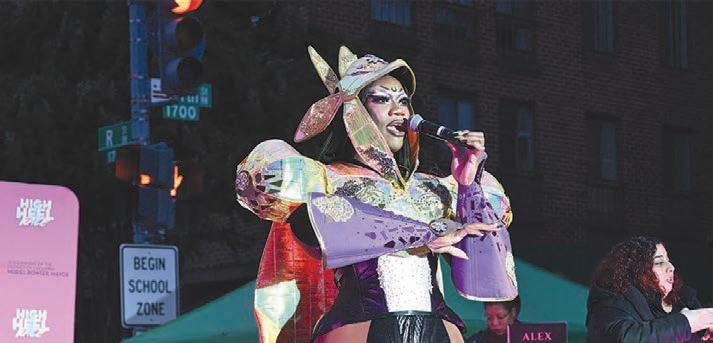
Costumed competitors run down 17th Street for annual event
(Washington Blade photos by Michael Key)
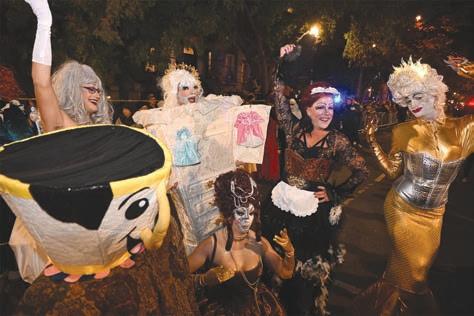





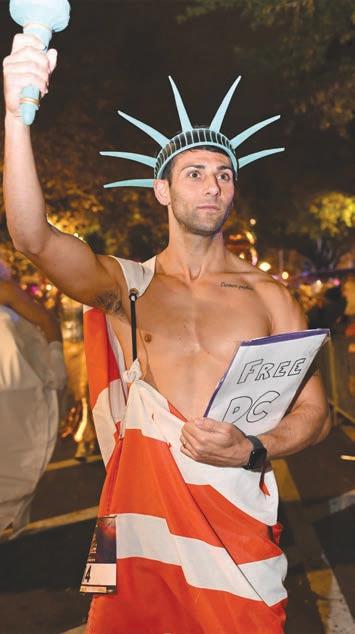

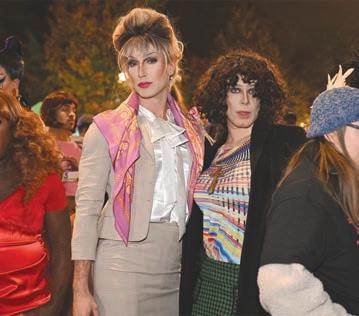




By VALERIE M. BLAKE
Each October, we decorate our homes with cobwebs, skeletons, and flickering jacko’-lanterns to create that spooky Halloween atmosphere. But for anyone who’s ever been through a home inspection there’s no need for fake scares. Homes can hide terrors that send chills down your spine any time of year. From ghostly noises in the attic to toxic monsters in the basement, here are some of the eeriest (but real) things inspectors and homeowners discover.
Every haunted house movie starts with a creepy basement, and in real life, it’s often just as menacing. Mold, mildew, and hidden water leaks lurk down there like invisible phantoms. At first, it’s just a musty smell — something you might brush off as “old house syndrome,” but soon enough, you realize those black or green patches creeping along the walls can be more sinister than any poltergeist.

Black mold (Stachybotrys chartarum) is particularly fearsome - it thrives in damp, dark places and can cause serious respiratory problems. It’s not just gross - it’s toxic and, while some types of mold can be easily cleaned up, removing black mold can cost more than an exorcism.
Have you ever heard strange buzzing or seen flickering lights that seem to move on their own? Before you call the Ghostbusters, call an electrician. Faulty wiring, outdated panels, and aluminum circuits from the mid-20th century are the true villains behind many mysterious house fires. Home inspectors can also find open junction boxes, frayed wires stuffed behind walls, or overloaded breaker panels that hum like a restless spirit.
Imagine an invisible specter floating through your home - something that’s been there since the 1950s, waiting for you to disturb it. That’s asbestos. Home inspectors dread discovering asbestos insulation around old boilers or wrapped around ductwork. It’s often lurking in popcorn ceilings, floor tiles, and even wall plaster. You can’t see it, smell it, or feel it—but inhaling those microscopic fibers can lead to serious illness decades later.
Lead pipes, once thought to be durable and reliable, are like the vampires of your water system - quietly poisoning what sustains you. The results of a lead test can be chilling: even a small amount of lead exposure is dangerous, particularly for children. And it’s not just pipes - lead paint is another problem that refuses to die. You might find it sealed beneath layers of newer paint, biding its time until it chips or flakes away. This is why, when selling a property built prior to 1978, homeowners must disclose any knowledge of lead paint in the home and provide any records they may have of its presence or abatement.
Scratching in the walls. Tiny footsteps overhead. Droppings in the attic. It’s not a poltergeist - it’s pests. Termites, rats, bats, carpenter ants, and even raccoons can do more damage than any ghost ever could.
Termites are the silent assassins of the home world, chewing through beams and joists until the structure itself starts to sag. Rats and mice leave behind droppings that can spread disease and contaminate food. Bats are federally protected, meaning your haunted attic guests can’t just be evicted without proper precautions. And I once had a raccoon give birth in my chimney flue; my dogs went crazy.
Ever step into a home and feel the floors tilt under your feet? That’s no ghostly illusion - it’s the foundation shifting beneath you. Cracked walls, doors that won’t close, and windows that rattle in their frames are the architectural equivalent of a horror movie scream.
Foundation damage can come from settling soil, poor drainage, or tree roots rising from under the structure. In extreme cases, inspectors find entire crawl spaces flooded, joists eaten by rot, or support beams cracked like brittle bones. Repair costs can be monstrous - and if left unchecked, the whole house could become a haunted ruin.
Some homes hold more than just physical scares. Behind the drywall or under the floorboards, inspectors may uncover personal relics - old letters, photographs, even hidden safes or forgotten rooms. Occasionally, however, there are stranger finds: jars of preserved “specimens,” taxidermy gone wrong, or mysterious symbols scrawled in attic spaces.
These discoveries tell stories of the people who lived there before, sometimes fascinating, sometimes chilling, but they all add to the eerie charm of an old home, reminding us that every house has a history — and some histories don’t like to stay buried.
So, while haunted houses may be a Halloween fantasy, the real terrors in homeownership come from neglect, not ghosts. Regular inspections, good maintenance, and modern updates are the garlic and holy water that turn a trick of a home into a treat.
is a licensed Associate Broker in D.C., Maryland, and Virginia with RLAH @properties. Call or text her at 202-246-8602, email her via DCHomeQuest.com, or follow her on Facebook at TheRealst8ofAffairs.


















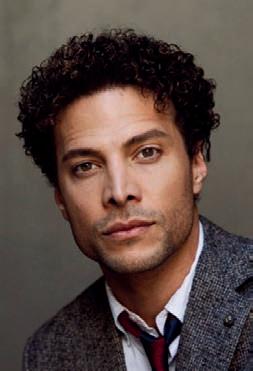
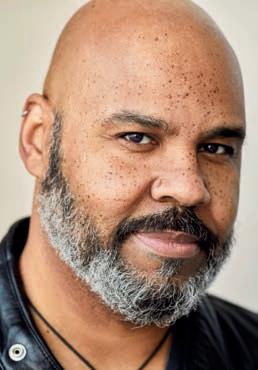




JUSTIN GUARINI

JAMES MONROE IGLEHART



CHEYENNE JACKSON




GET READY TO BE SWEPT AWAY AS THE THREE BROADWAY TENORS—JUSTIN GUARINI (AMERICAN IDOL, WICKED), CHEYENNE JACKSON (GLEE, 30 ROCK), AND TONY AWARD
WINNER JAMES MONROE IGLEHART (ALADDIN)—JOIN FORCES WITH THE AMERICAN POPS ORCHESTRA FOR THE VERY FIRST TIME AT THE BEAUTIFUL LANG THEATER AT ATLAS

THURS. NOV 6TH , 2025 @ 7PM GUARINI WITH THE AMERICAN POPS PERFORMING ARTS CENTER. A ONE-NIGHT-ONLY CONCERT!












FERNANDO’S CLEANING
Residential & Commercial Cleaning, Reasonable Rates, Free Estimates, Routine, 1-Time, Move-In/Move-Out
202-486-6183

COUNSELING FOR LGBTQ
People. Individual/Couples counseling with a volunteer peer counselor. GMCC, serving our community since 1973. 202-580-8861
gaymenscounseling.org No fees. Donation requested.
Local licensed company with over 25 years of experience. Specializing in bathrooms, kitchens & all interior/exterior repairs. Drywall, paint, electrical, wallpaper, roofing & siding. Trevor 703-303-8699
LEGAL SERVICES
ADOPTION, DONOR, SURROGACY
legal services. Catelyn represents LGBTQ clients in DC, MD & VA interested in adoption or ART matters. MODERN FAMILY FORMATION Law Offices, Slattery Law, LLC. 240-245-7765
Catelyn@ModernFamilyFormation.com
WHERE DO YOU WANT TO GO?

I can take you there in my Lincoln Nautilus KASPER’S LIVERY SERVICE Proper DC License & Livery Insured. Gay & Veteran Owner/Operator. Since 1987. 202-554-2471 www.KasperLivery.com
probate, small estates & foreign estates. Public notices are required to be published in newspapers of general circulation because these venues (now both print & online) reach the largest number of people in the community, while offering an easily archivable & verifiable outlet to make sure the notice was published when & how it was intended. Further, newspapers display notices in the context of other news & information that people in the community read. Newspapers & their associated websites are the appropriate forums for notices that affect citizens & the general public. Ask the court to publish yours in the Blade. The courts will take care of the setup process and we will bill you. Another way to support your LGBTQ newspaper!


Parking & storage included 2301 Champlain Street, NW Text 202-997-9618
RENT / VA

POTOMAC YARD STUDIO
10 minute walk to the metro, & Target . All utilities included In-law suite style studio apartment, in a beautiful neighborhood. Available December 1. 2025, unfurnished hardwood floors, single occupancy only. $1,700.00. Call Craig 202.669.6972
If you need assistance, please email the text & image to: classifieds@washblade.com or call 202-747-2077 x 8092 leave a message! PERSONAL & HOUSING SHARE ADS ARE STILL FREE! *First 25 words or less.

